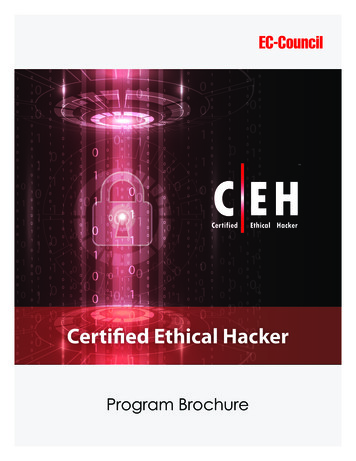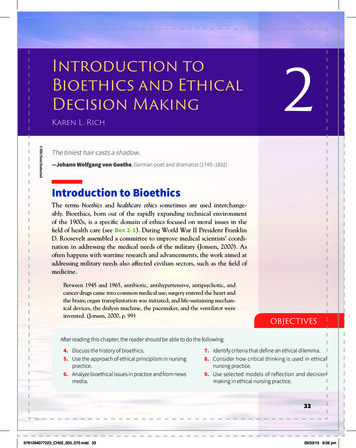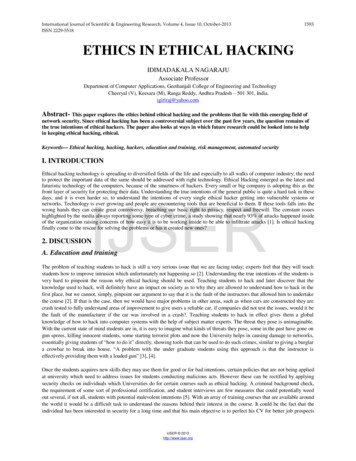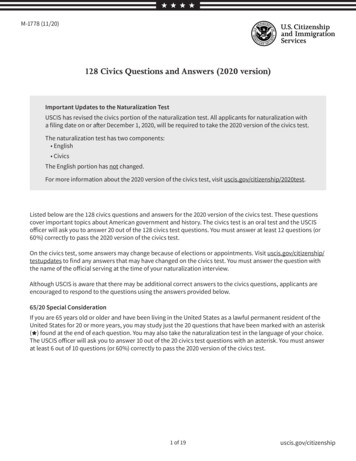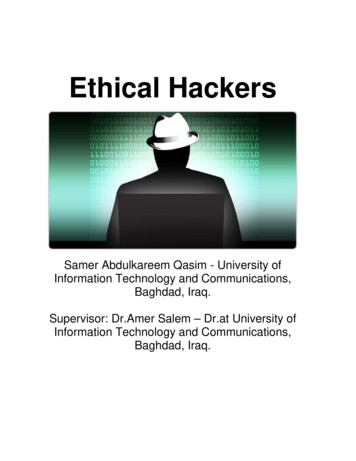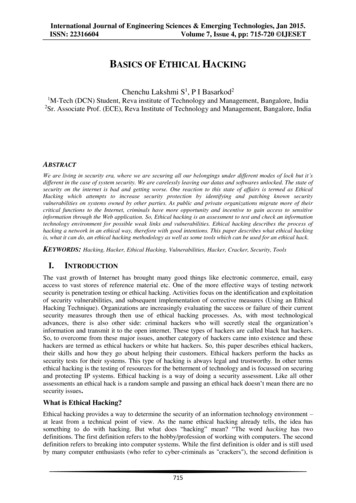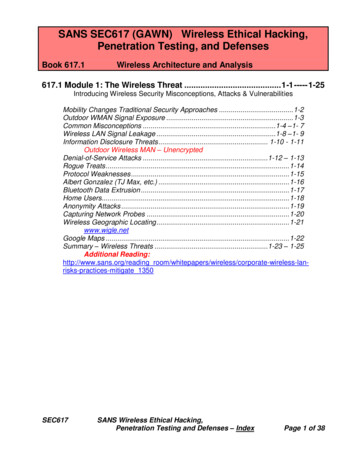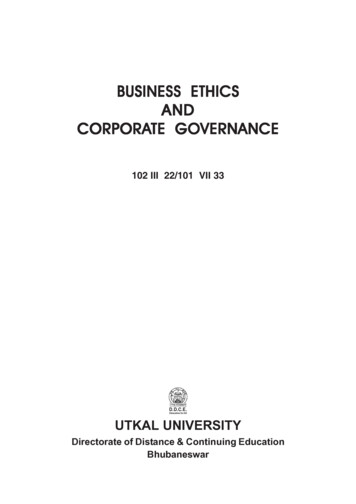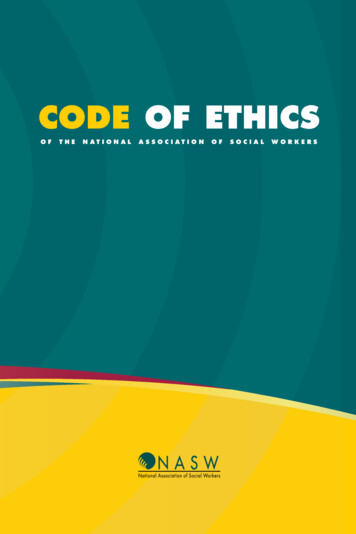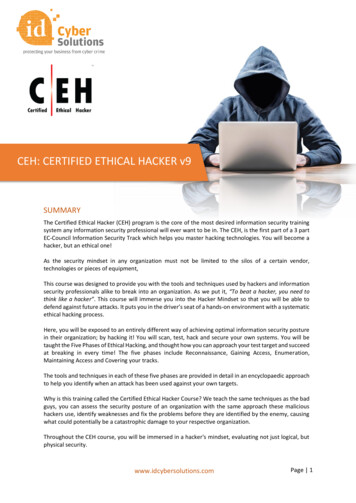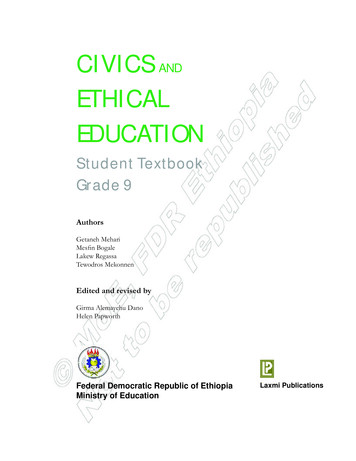
Transcription
CIVICS ANDETHICALEDUCATIONStudent TextbookGrade 9AuthorsGetaneh MehariMesfin BogaleLakew RegassaTewodros MekonnenEdited and revised byGirma Alemayehu DanoHelen PapworthFederal Democratic Republic of EthiopiaMinistry of EducationLaxmi Publications
AcknowledgementsThe redesign, printing and distribution of this textbook has been funded through the General Education QualityImprovement Project (GEQIP), which aims to improve the quality of education for Grades 1–12 students ingovernment schools throughout Ethiopia.The Federal Democratic Republic of Ethiopia received funding for GEQIP through IDA Credit No. 4535-ETfrom the International Development Associations, the Fast Track Initiative Catalytic Fund (FTICF) and otherdevelopment partners — Finland, Italian Development Cooperation, the Netherlands and UK aid from theDepartment for International Development (DFID).Many individuals and organisations, too many to mention here, also gave their unreserved support to makethe textbook and accompanying teacher guide a reality. However, special thanks must go to Myra Murby whodevotedly spent time to build the capacity of the Ministry textbook writers to enable them to produce interactiveand student friendly teaching and learning materials. The European Union’s financial support of Myra’s work inEthiopia is greatly appreciated.Gratitude is also extended to the House of Federation of the Federal Democratic Republic of Ethiopia, theEthiopian Press Agency, the Ministry of Culture and Tourism, the former Ministry of Information, the Instituteof Ethiopian Studies, the Ethiopian Teachers’ Association and the Ethiopian Educational Material Production andDistribution Agency, all of which provided pictures that are used in the textbook.The work of Helen Papworth, a VSO volunteer, who, with the former Civics and Ethical Education Department,edited, reviewed and formatted the draft textbook and teacher guide, is gratefully acknowledged. Thanks also goto the Voluntary Service Overseas for arranging the placement of British volunteers in the Ministry and enablingus to use their expertise on this and other projects. Federal Democratic Republic of Ethiopia, Ministry of EducationFirst edition, 2002 (E.C.)Redesigned, printed and published for the Ministry of Education by Laxmi Publications (P) Ltd., India, underGEQIP Contract No. ET-MoE/GEQIP/IDA/ICB/010/09.ISBN: 978-99944-2-000-1All rights reserved. No part of this publication may be reproduced, stored in a retrieval system or transmitted inany form or by any means (including electronic, mechanical, photocopying, recording or otherwise) either priorwritten permission of the copyright owner or a licence permitting restricted copying in Ethiopia by the FederalDemocratic Republic of Ethiopia, Federal Negarit Gazeta, Proclamation No. 410/2004 Copyright and Neighbouring RightsProtection Proclamation, 10th year, No. 55, Addis Ababa, 19 July 2004.Disclaimer:Every effort has been made to trace the copyright owners of material used in this document. We apologise inadvance for any unintentional omissions. We would be pleased to insert the appropriate acknowledgement in anyfuture edition.
ContentsIntroduction1Unit 1: Building a Democratic System21. Democracy and the Democratic System32. Rights73. Obligations104. Tolerance of Diversity135. Systems of Government in Ethiopia186. Limits of Power207.24Ethiopia’s Foreign RelationsUnit 2: Rule of Law311. Constitution322. Rule of Law353. Power of Government374. Rule of Law and Corruption39Unit 3: Equality431. Equality of Nations, Nationalities and Peoples of Ethiopia442. Equality of Citizens in the Ethiopian Constitution463. Gender Equality504. Equality within Diversity53Unit 4: Justice571. Justice and Equity582. Justice in Social Services603. Struggling Against Injustice624. The Justice System645. Justice in Taxation68Unit 5: Patriotism721. Citizenship and Patriotism73
2. Objectivity in Ethiopian History773. Duties of a Patriot794. Patriotism and the Fight Against Poverty825. Voluntarism84Unit 6: Responsibility891. What is Responsibility?902. Personal, Social and Constitutional Responsibilities943. Natural Resources and our Historical and Cultural Heritage974. Responsibility to Combat HIV/AIDS103Unit 7: Industriousness1081. Work Hard and be on Time1092. The Importance of Work1113. Economic Systems1134. Work Ethics116Unit 8: Self-Reliance1201. What is Self-reliance?1212. Dependency1243. Decision Making128Unit 9: Saving1321. Saving and Extravagance1332. Planning and Saving1353. Money as a Source of Wealth137Unit 10: Active Community Participation1401. The Meaning of Community Participation1412. The Role of Civic Societies in Community Participation145Unit 11: The Pursuit of Wisdom1491. The Basis of Knowledge and Wisdom1502. Information and Data1533. Reading and Studying1554. The Pursuit of Truth157
IntroductionThis book is written for students studying Civicsand Ethical Education in Grade 9. It will guideyou through the 11 values with readings, case studies,questions and illustrations to support the text. Each unitbegins with an introduction and states the lessons andthe outcomes. It also provides a list of the key wordsand concepts you will meet in the unit.At the end of each unit, there is a summary of whatyou have read. There is also a glossary of some termsor words which you have been introduced to in theunit. Finally, there are unit review exercises to enableyou to test your knowledge and understanding of theunit content.Each unit is set out in the same way with the unit numberand title at the top of each page.The objectives are listed at the beginning of each lesson.A starter activity is in a blue box. This is to introduceyou to the lesson. The lesson number is in the top rightcorner of each page.Readings have a blue background. They provideinformation which explains the lesson objectives.On many pages, you will find photographs or pictureswhich illustrate the topic you are studying.Case studies are labelled and have a pink background.They provide real or simulated examples of the conceptyou are studying.Each lesson has at least one set of questions linked toa reading or a case study. Look for the red questionmarks.At the end of each lesson, you will find a list of pointsto remember in a red box. This will help you to revise.This book is just one resource which you and yourfellow students will use to learn about Civics and EthicalEducation at this level. Information to support thisbook will be located with your teacher, on the Plasmaprograms, in other books and documents, and withpeople in your communities.CIVICS AND ETHICAL EDUCATION — GRADE 9 STUDENT TEXTBOOK 1
Democracy and the DemocraticUnit 1 SystemBuilding a Democratic SystemIntroductionThis unit is very important as you will learn the basic ideas of democracy and the democratic system.When you complete this unit, it will help you to understand the other units more easily.Key words and conceptsLessons1. Democracy and the Democratic System Ambassador Foreign Policy2. Rights Autocracy Foreign Relations3. Obligations Citizen Government4. Tolerance of Diversity Confederation Human Rights5. Systems of Government in Ethiopia Constitution Indirect Democracy6. Limits of Power Democracy Majority Rule7. Democratic system Negotiation Dictatorship Obligations Diplomacy You will: DiplomatRepresentativeDemocracy appreciate the meaning of democracy. Direct Democracy Rights realize the basic rights of Ethiopian citizensas stated in the Federal Constitution. Diversity Tolerance Election Unitary Federation VotingEthiopia’s Foreign RelationsWhat you will learnVoting in elections — One of the pillars of democracy2 CIVICS AND ETHICAL EDUCATION — GRADE 9 STUDENT TEXTBOOK
UNIT 1 — BUILDING A DEMOCRATIC SYSTEML E S S O NLESSON 11Democracy and the DemocraticSystemBy the end of this lesson, you should be able to: define democracy. state the characteristics of democracy. demonstrate some democratic characteristics.this type of democracy, people are involved inthe day-to-day decision making of governmentindirectly through their elected representatives.This is called representative or indirectdemocracy.The Ancient City of Athens What do you know about democracy? Can youexplain your ideas to the class? Give some practical examples to show whenyou made a democratic decision with yourfriends, e.g., deciding who is to play in thefootball team. Is it sometimes difficult to be democratic?Discuss this as a class.The Parthenon: One of the Seven Wonders of the WorldWhat Democracy is?The Modern AthensDemocracy is a type of government where peopleelect their leaders. The ancient Greeks in Athensfirst practiced it. Women and slaves had noright to elect their leaders and were not able tobe elected. In Athens, a council of 500 citizenscarried out the day-to-day government’s work.However, an assembly of all citizens living in thecity-state voted on all-important issues. This is adirect democracy.Today we practice democracy in a different way.Everybody has the right to elect representativesto Parliament, Congress or Shengo. Everyonehas the right to stand for election. There is nodiscrimination based on sex and occupation. InAthens gave the world Socrates, Plato and Aristotle,systematic mathematics, the Olympics and, above all,democracyCIVICS AND ETHICAL EDUCATION — GRADE 9 STUDENT TEXTBOOK 3
UNIT 1 — BUILDING A DEMOCRATIC SYSTEMLESSON 1Democracy and the Democratic SystemThe word democracy is a combination of twoGreek words, Demos and Kratos. Demos meansThe People and Kratos means Authority. The directmeaning of democracy is People’s Authority.The 1995 Constitution of Ethiopia expresseshow representative democracy works in Ethiopiain its Article 54 as follows:Members of the House of Peoples’ Representativesshall be elected by the People for a term of five years onthe basis of universal suffrage and by direct, free andfair elections held by secret ballot.in the present world in limited ways. Duringreferendum and in small communities directdemocracy can be practiced. Small communitieslike the Bana and Hamer in south western Ethiopiacan decide on matters that affect their cultural andeconomic development through direct democracy.In kebeles, some aspects of direct democracy canbe exercised.Form groups of six students. In each group,three will discuss direct democracy andthe other three, indirect democracy. Sharefeedback with the other groups.Nonetheless, direct democracy is practicedCASE STUDYElecting a class representativeOn October 6, 2007, students in a high school electedtheir class representatives. The homeroom teachersfacilitated the election. The homeroom teacher of 9Bhelped the students to form an election committee.The election committee explained to the students thatthe election would be conducted secretly.Following this, the students nominated theircandidates: Goyteom, Fatuma and Ayele. The candidateseach made a fifteen minute speech explaining whatthey would do if elected. Then voting was conductedand the election committee announced the results.Should Fatuma serve only those students whoelected her or the whole class?In your own class, if there is an election, wouldyou vote for your friend or someone who isgoing to serve all the students equally?A democratic system is the best system wehave had so far. This is because the people arethe source of government power. Because of this,it is defined as Rule by the People. A democratic4 rksWinner7487 did not voteFatuma became the winner, so the electioncommittee chair invited her to make a speech to theclass. She thanked them and promised to serve themall equally.system has the following characteristics: a democratic constitution the rule of law free, fair and regular elections active citizen participation respect for human and democratic rightsA democratic constitution is the fundamentallaw or legal document that expresses the will ordesires of the people. It is a vital component of ademocratic system.CIVICS AND ETHICAL EDUCATION — GRADE 9 STUDENT TEXTBOOK
UNIT 1 — BUILDING A DEMOCRATIC SYSTEMLESSON 1Democracy and the Democratic SystemThe rule of law is the legal practice or exercisethat treats all citizens impartially or equally. Therule of law does not consider a person to be acriminal until convicted before a court of law.The rule of law can only be exercised under ademocratic system.of person are part of human rights. The rightsof thought, opinion and expression are part ofpolitical rights. Without such rights no democraticsystem can exist. As a citizen of Ethiopia, you havethese rights to enjoy.Free, fair and regular elections are conductedunder a government whose source of power isthe people. Such a government is a democraticgovernment. Such practice includes no intimidationduring elections, accepting election results andresolving problems arising through peacefulnegotiations and compromise.Democracy is rule by the people. They arethe ultimate source of power for the government.When there is active citizen participation in thesocial, economic and political life, democratic ruleis ensured.Respect for human and democratic rightsThese are essential components of a democraticsystem. The rights to life, liberty and the securityPerson voting in a democratic electionPoster encouraging democracyCIVICS AND ETHICAL EDUCATION — GRADE 9 STUDENT TEXTBOOK 5
UNIT 1 — BUILDING A DEMOCRATIC SYSTEMLESSON 1Democracy and the Democratic SystemFreedom of speechFreedom of speech is an essential feature orprinciple of democracy. Without it no democraticsystem can exist. A democratic system rests on theexpressed will of the people. The media plays ahuge role in promoting freedom of speech.Form small groups. Each group should pickone characteristic of a democratic systemto discuss. The group representatives shouldpresent their ideas to the class.Counting votes after an electionREMEMBER6 Democracy is defined as Rule by the People. In a direct democracy, the people are involved directly in the day-to-daydecision-making. In an indirect democracy, the people are involved indirectly through their ownelected representatives. A democratic system requires a democratic constitution and the rule of law. Democracy is possible when free, fair and regular elections are held. Respect for human rights is necessary in a democracy.CIVICS AND ETHICAL EDUCATION — GRADE 9 STUDENT TEXTBOOK
UNIT 1 — BUILDING A DEMOCRATIC SYSTEML E S S O NLESSON 22RightsBy the end of this lesson, you should be able to: explain the basic human and democratic rightswhich all people have. defend your human and democratic rights. What do you understand about rights? What rights do you think you have?In a democracy, every person has fundamental rightsand freedoms. Rights refer to political, economic,social, and other advantages to which someone hasa just claim, morally or in law. Rights include thefreedom to act or not to act in a particular fashion.Rights involve duty to permit the same freedom toothers. The rights that citizens in Ethiopia have areexpressed in detail in the 1995 Constitution. Rightscome under two categories. The first one is humanrights. This includes the right to life, the right toliberty, the right to privacy, etc.The right to life is stated in the FederalConstitution under Article 15 as follows:Every person has the right to life. No person maybe deprived of his life except as a punishment for aserious criminal offence determined by law.Under Article 26 sub-article 1, the right toprivacy is stated as:Everyone has the right to privacy. This right shallinclude the right not to be subjected to searches of hishome, person property, or the seizure of any propertyunder his personal possession.The second is democratic rights. Theserights include the right of thought, opinion andexpression. Freedom of association, movementand rights of nationality are part of democraticrights as stated in the Federal Constitution underArticle 24 sub-articles 1 and 2:1. Everyone has the right to respect for his humandignity, reputation and honour.2. Everyone has the right to the free developmentof his personality in a manner compatible withthe rights of other citizens.As a child you have some special rights toenjoy. You have protection under these rights.Concerning the rights of children, the EthiopianConstitution under Article 36 sub-article 1 statesthe following:Every child has the right:(a) To life;(b) To a name and nationality;(c) To know and be cared for by his or her parentsor legal guardians;(d) Not to be subjected to exploitative practices,neither to be required nor permitted to performwork which may be hazardous or harmful tohis or her education, health or well-being;(e) To be free of corporal punishment or crueland inhumane treatment in schools and otherinstitutions responsible for the care of children.All children have the right to educationand health careLikewise, the Federal Constitution recognizeswomen’s rights: Article 35 sub-articles 1, 2, and 7state the rights of women:1.Women shall, in the enjoyment of rights andprotections provided for by this Constitution,CIVICS AND ETHICAL EDUCATION — GRADE 9 STUDENT TEXTBOOK 7
UNIT 1 — BUILDING A DEMOCRATIC SYSTEMLESSON 2Rightshave equal right with men.Children from different ethnic groups at school2. Women have equal rights with men in marriageas prescribed by this Constitution.7.Women have the right to acquire, administer,control, use and transfer property. In particular,they have equal rights with men with respectto use, transfer, administration and control ofland. They shall also enjoy equal treatment inthe inheritance of property.As citizens of Ethiopia, you have theconstitutional protection to use these rights. It isimportant for you to know about these rights sothat you can defend and use them properly. In thepast, children’s rights and the rights of womenwere not given constitutional protection.This resulted in many abuses being madeagainst them. Female students should know abouttheir constitutional rights so that they will be ableto defend themselves for their own good.These rights are part of the internationalagreements and conventions that many countrieshave incorporated in their legal systems. Theyare included in the United Nations UniversalDeclaration of Human Rights. The Declaration wasissued in 1948. Since then it has been enriched bysubsequent agreements and conventions compiledas International Instruments. Ethiopia has ratifiedsome of these instruments and they are part ofthe law of the country.Article 10 of the Constitution deals withHuman and Democratic Rights as follows:1. Human rights and freedoms, emanating fromthe nature of mankind, are inviolable andinalienable.2. Human and democratic rights of citizens andpeoples shall be respected.According to the Constitution, these rightsmust not be violated. They are considered asinalienable and cannot be taken away from anyperson. Everyone is born to enjoy these rights.In the past, human and democratic rightswere not respected in Ethiopia. The governmentswere suppressing the rights of the people. Thus,the people had no freedom. Many of those whoattempted to resist were killed. Some were put inprison, and some others were forced to leave theircountry in exile.Copy this table. Form groups to discuss and list on the copy your democratic and human rights inschool, at home and in the community. One example is provided.Human and Democratic RightsAt school1At homeTo be cared for by parentsor guardians2348 CIVICS AND ETHICAL EDUCATION — GRADE 9 STUDENT TEXTBOOKIn the community
UNIT 1 — BUILDING A DEMOCRATIC SYSTEMLESSON 2RightsCASE STUDYHuman Right’s AbuseAnenni lives with her parents who are farmers. She is13 years of age and is learning in Grade 9 in a townnear her home. After school, on her way back home,she met a group of three people coming towards her.Unable to escape, she was beaten up and raped.AIDS. She continued going to school but was veryupset. The rapist and his collaborators were broughtbefore the court. The rapist was imprisoned with hisaccomplices. But Anenni has to live with HIV/AIDSfor the rest of her life.The rapist was an HIV/AIDS victim. After a bloodtest, she knew that she had become a victim of HIV/Under which kind of rights do you think that: Rape is a crime? The parents of Anenni brought the rapist to court? Anenni was going to school? Her decision to continue going to school is the correct decision?REMEMBER Every person has fundamental rights and freedom. In a democracy, all citizens have human and democratic rights. The right to life is the right not to be killed. You have some special rights to enjoy, such as the rights of the child and theright to education. In a democracy, every person has fundamental rights and freedoms. In the past, children’s rights were not constitutionally recognized and womendid not have constitutional protection, so many abuses were made againstthem. Rights could be political or social advantages to which someone has a justclaim, morally or in law. Rights involve the duty to permit the same freedom to others.CIVICS AND ETHICAL EDUCATION — GRADE 9 STUDENT TEXTBOOK 9
UNIT 1 — BUILDING A DEMOCRATIC SYSTEML E S S O NLESSON 33ObligationsBy the end of this lesson, you should be able to: explain the obligations which citizens have. give due respect to your friends. Do you have any idea what obligations are? Discuss the obligations which you and yourfriends, or members of families, have to eachother. What obligations do you have in school,community and in your own family?In the previous lesson, you studied rights andyou have seen that you have certain rights. Inthis lesson, you will learn about the obligationswhich you have when exercising your rights.You have many rights to enjoy but no societygives its citizens limitless rights. Sharing rightswith others requires an ability to keep the balancerequired between yourself and others. You haveto respect the same rights others have. Knowledgeof the extent of your own rights enables youto understand the obligations you have. Yourobligations arise from the relations you havewith others. In other words, your obligationsarise from your social life. Your obligations areconditioned by social norms, customs, values,traditions and culture. Law also has a role inmaintaining certain obligations. There are thingsthat the law prohibits and certain obligations that10 citizens have to respect to be lawful.Obligations are duties to fulfill. You have theobligation, or duty, to respect the rights of others.You have the obligation not to violate others’rights.As a student, you have the right to education.At the same time, you have the obligation torespect the rules of your school. These obligationsmay include wearing uniform, doing homeworkand arriving at school on time. You have theobligation to protect school and public propertiesfrom damage. In your class, you have the obligationto respect the rights of other students.Outside school you have the obligation toparticipate in community activities. This mayinclude taking part with others in sanitationactivities in your kebele. You have a duty to helpparents at home.When you grow up, you will have constitutional obligations to fulfill. One of these obligations is paying tax. The tax you will pay helpsexpand schools and health care services in placeswhere they are not available.Paying tax is not a burden but an opportunityfor the tax payers. It is one way of participatingand contributing to the development of thecountry. To work to improve one’s own life ispart of the economic right of citizens, but payingtax proportional to one’s income is an obligation.CIVICS AND ETHICAL EDUCATION — GRADE 9 STUDENT TEXTBOOK
UNIT 1 — BUILDING A DEMOCRATIC SYSTEMLESSON 3ObligationsFulfilling your obligations gives you the freedomto use all the rights you have as a citizen.Article 9 sub-article 2 of the Federal Constitution expresses citizens’ obligations as follows:All citizens, organs of state, political organizations,other associations as well as their officials have the dutyto ensure observance of the Constitution and to obeyit.Copy this table. Form groups, discuss and list on the copy some of the obligations you have at school,at home and in the community. An example is provided.ObligationsAt school1At homeIn the communityRespecting school rules2345Citizens involved in community participationCIVICS AND ETHICAL EDUCATION — GRADE 9 STUDENT TEXTBOOK 11
UNIT 1 — BUILDING A DEMOCRATIC SYSTEMLESSON 3ObligationsCopy this table. Form groups to discuss andlist on the copy what tax money could do forEthiopia. An example is provided.What tax money could do fordevelopment1Road construction2345Tax payer fulfilling obligations6REMEMBER12 Obligations are duties. When you grow up, you will have constitutional obligations to fulfill. You have the duty to help your parents at home. You have the obligation to protect school and public properties from damage. Paying tax is not a burden but an opportunity for the tax payers. Paying tax is one way of participating and contributing for the development ofthe country. There is no society that gives its citizens limitless rights. Your rights are limitedbecause you share rights with others. Knowledge of the extent of your rights enables you to understand yourobligations. Your obligations arise from the relationship you have with others. Your obligations are conditioned by social norms, customs, values, traditionsand cultures.CIVICS AND ETHICAL EDUCATION — GRADE 9 STUDENT TEXTBOOK
UNIT 1 — BUILDING A DEMOCRATIC SYSTEML E S S O NLESSON 44Tolerance of DiversityBy the end of this lesson, you should be able to: describe what tolerance of diversity is. explain the distinctive characteristics of post1991 Ethiopian society. demonstrate tolerance of diversity.Give examples of how you have had to be tolerantwith family and friends. Discuss as a class.Diversity is to be different in some ways. It couldbe defined as the range of different groups thatmake up a wider population. For example, inyour own class there are probably students whospeak different languages and follow differentreligions. This is one form of diversity. Some ofthe students in your section are tall, short, fator thin. This shows physical differences. Somestudents in your class may like to drink coffee,while others tea. This is a difference in individualtaste. You can also see that some students havedifferent view points on some issues from others.These are differences of opinion. Such differencesyou observe show diversity.In the broader sense, diversity occurs whenvery different people come together within agroup or place. Your own class is a good examplewhere you see diversity in religion, language,ethnic group and the like. People living in yourcommunity could have the same diversity thatyou observe in school.The same diversity is seen at a national level.The fact that more than eighty languages arespoken, the different religions and the variety oftraditions and customs show evidence of diversity.Democracy teaches us that cultural diversity isvery valuable.A country with cultural diversity is as beautifulas a painting made up of different colours. Ademocratic system is characterized by diversity.In Ethiopia, past governments failed to seediversity in a positive way. Failing to appreciatecultural diversity leads to treating some culturesas superior and others as inferior. This happenedin Ethiopia for a long time. The democratic government that came to power in 1991 issued theconstitution that changed the ways of the past.Today, the Nations, Nationalities and Peoples ofEthiopia are equal. They have the constitutionalright to promote and develop their cultural identity. This is multiculturalism. It means accepting all cultural groups as equal and gives equalopportunity for their development.In line with this, the Constitution underArticle 91 sub-article 1 states:Government shall have the duty to support, on thebasis of equality, the growth and enrichment of culturesand traditions that are compatible with fundamentalrights, human dignity, democratic norms and ideals,and the provisions of the Constitution.CIVICS AND ETHICAL EDUCATION — GRADE 9 STUDENT TEXTBOOK 13
UNIT 1 — BUILDING A DEMOCRATIC SYSTEMLESSON 4Tolerance of DiversityEthiopia — A land of cultural diversityCopy this table. Form groups, discuss and liston the copy the different cultural groups youknow in your surroundings and in Ethiopia. Anexample is provided.Ethiopia — A land of differentcultures1Hamer2345678910Different Cultures of EthiopiaCASE STUDYSchool friendsAziza, Tolossa, Yerga, Mebrat and Leul are studentsin a high school. They are close friends. Azizais a Muslim and Tolossa is a Protestant. Yerga isa Jehovah’s Witness while Mebrat and Leul areOrthodox Christians.These friends belong to different ethnic groups.Yerga is a Guraghe, Aziza is a Hararri and Tolossais an Oromo, Mebrat is an Amara and Leul is aTigre. They are very proud of their own religions,languages, and other cultural traits. As friends, theyshare similar views and respect each other’s cultures.When the school year is over they have agreed to go14 to Emdeber and stay there for one week with Yerga’srelatives.Next year, during semester break, Tolossa haspromised to take them to Gendeberet to visit hisparents. They have agreed to continue this plan tovisit everyone’s relatives in order to see their way oflife.Form groups to discuss what lesson you learntfrom the school friends in the case study.The group leaders should present their ideasto the class for discussion.CIVICS AND ETHICAL EDUCATION — GRADE 9 STUDENT TEXTBOOK
UNIT 1 — BUILDING A DEMOCRATIC SYSTEMLESSON 4Tolerance of DiversityYou have seen that diversity occurs whengroups and individuals have different culturesand viewpoints. In order to handle diversity, youneed to be tolerant.Tolerance means acceptance of a person, groupor
the textbook and accompanying teacher guide a reality. However, special thanks must go to Myra Murby who devotedly spent time to build the capacity of the Ministry textbook writers to enable them to produce interactive and student friendly teaching and learning materials.
